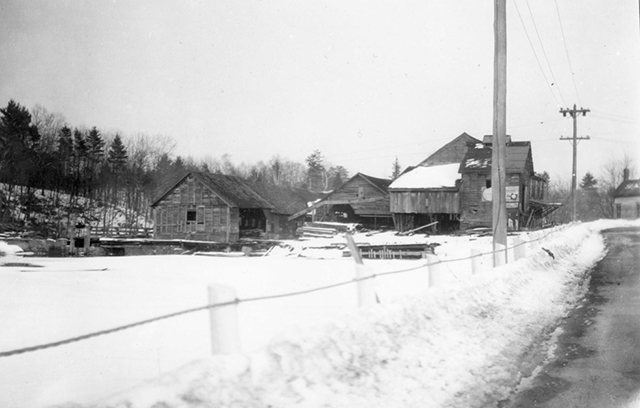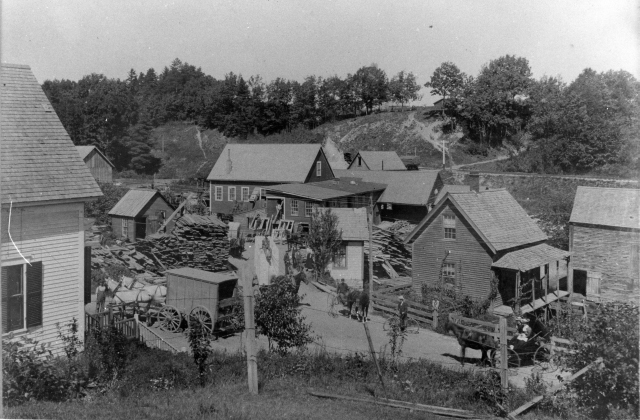

![The children of Dyers Crossing School, October 1929: Front: Raymond Hersey, Richard Rayno, Rodney Emery, Kenneth Rayno, Albert Hoyt. Back: James Hersey, Dexter Emery, Virginia [last name unknown], Doris Vermette, Elsie Hersey. Miss Frances Farrar with their "Cadet Teacher."](https://andoverbeacon.com/wp-content/uploads/2015/12/history-hoyt-road-eva-emery-002-e1451947741683.jpg)
She was a talented musician and was known unofficially as “East Andover’s music teacher. She played the piano, organ, violin, accordion, banjo, ukulele, and Spanish guitar. She played the organ at church and was a soloist. She gave piano and organ lessons to area children, charging 25 cents.
I was surprised to learn that Eva had given lessons to my mother and cousin, Edith Robie. This was one story I do not remember hearing from my mother.
Eva was very active in the Grange, even working her way up to position of Master. She was also a charter member of the Fortnightly Club. This was an East Andover women’s group whose membership was limited to only 20 people at one time.
The Sawmill and Lumber Business
Besides the farming business, the Emerys were very much into the lumber and sawmill business. Jay’s father owned the sawmill in Franklin, which was located at the sharp corner on Webster Street (now Chance Pond Road). Jay worked in the mill with his father while growing up, and he bought his own mill after he was married (the former Aiken mill on today’s Valley Road in East Andover).
With two businesses to run, Jay’s father saw the need for better communication between his East Andover farm and his Franklin mill. Telephone service between the two places seemed to be the answer. Consequently, he paid to have the telephone line from Franklin extended to his house in East Andover.
It’s not clear exactly when this occurred, but a search of our property deeds provided a clue. Joseph S. Cullen – a previous owner – granted an easement on May 22, 1902 to the New England Telephone and Telegraph Company. Most likely, the line was extended to the Emery farm shortly after this.
It was a big advantage for our family to have the telephone lines going right by our house. It allowed us to have phone service at a time when most people in rural areas didn’t have access to it. Some of the families in the Dyers Crossing area didn’t have telephones until the early 1960s, with their lines coming down from Emery Road.
My mother and Eva made good use of their phones, calling and chatting with each other frequently. Their conversations were almost always long, and we children became quite the pests as we anxiously waited to regain our mother’s full attention!
Today, our phone service is still on the Franklin line, as is that of our nearby neighbors and people on Hoyt Road who live close to the former Emery farm.
Changes on the Farm
In 1937, Jay’s father died. Since his mother couldn’t carry on alone, the little house was closed, and Jay and his family moved into the big house. The number of cattle, horses, and hens on the farm was greatly reduced, and all the hired men, except for one, were let go. Jay was busy running the mills, and unlike his father, the mills interested him more than farming.
Dexter and Rodney were brought up in the mill with their father, and they did not like farming. The men all had mill business in their blood, and the mill business was booming at this time. Dexter and Rodney both went on to own several mills of their own.
A big job for the Emerys in 1940 was supplying the large lumber needed for the building of the Franklin dam. But more changes were on the horizon.
The arrival of World War II changed things forever at the Emery farm, when both Dexter and Rodney joined the army. Before their sons left for the service, Jay and Eva divided the farm, deeding the big house and land on that side of the road to Dexter. The little house and land on the other side of the road was deeded to Rodney.
By this time, Jay’s mother had died, and Jay was away from home more and more as he ran his mills in other parts of the state. Finally, in 1948, after being alone on the farm for three years, Eva moved to Manchester, where she lived for the rest of her life.
She was active in the community there, just as she had been in East Andover. She made many new friends through the Grange and her church. In a 1987 letter written to Ginny Newton, she tells of knitting or crocheting 112 articles and dressing 26 dolls for the church fair the previous year. She was 91 at the time!
After his time in the service, Dexter returned to East Andover, living on the farm until his death in 1964 at age 46. He was a mill owner, and not a farmer, and the various buildings were sorely neglected.
Rodney did not return to live in his house, but he did renovate it, and over the years it was leased to several families. Jay died in 1976 and Rodney in 1984. Even though both sons had married, neither of them had children.
Both properties were sold in the early 1970s. Sadly, the big barn and most of the outbuildings were torn down. On a happier note though, much of Dexter’s property, which included the big house and barn, was put under conservation easement by the new owners, the Perrys.
Eva’s Presentation to the Andover Historical Society
In 1986, Eva wrote to Bill Leber, who was president of the Andover Historical Society. As a result, Bill visited Eva at her Manchester home on June 19 to accept the Emery family Bible, which had been published in Franklin in 1843. Eva felt that owing to the prominence of the Emery family in Andover, the Bible should be given to the Historical Society, where it would be taken care of and preserved.
Bill accepted the Bible for the Society, saying it would indeed be preserved and cherished. Property deeds and family pictures were also donated to the Society at this time.
Following the presentation, Eva told about her life – both as a child growing up, and as her life on the Emery farm in East Andover. Much of the recorded information was included in this article.
In April of 1988, Ginny received her last letter from Eva Emery. In that letter, Eva tells of celebrating her 93rd birthday with lots of friends stopping by to visit.
I was never exactly sure when Eva died, but recently I came across a letter of my mother’s, written by Eva in 1986. They had been corresponding ever since Eva’s move to Manchester, at which time they could no longer afford the luxury of talking on the phone. In those days, calls made to another town were known as “toll calls,” and they were very, very expensive!
In with this particular letter was a Polaroid picture showing Eva’s couch, which was filled with a variety of crocheted and knitted items she had made for her church’s fair. In this same envelope, my mother had placed a copy of Eva’s obituary. Eva died in 1994, just two months shy of her 99th birthday!